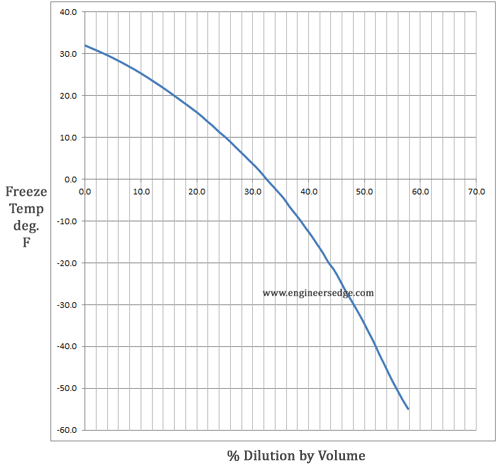Related Resources: heat transfer
Anti Freeze Freezing Boil Temperatures
Heat Transfer Engineering
Thermodynamics
Anti Freeze Ethylene Glycol Freezing and Boil Temperatures
Anti Freeze ( ethylene glycol and propylene glycol ), when not diluted with water, are actually less corrosive than water is with common construction metals. However, once diluted with water (as water from which they are prepared: when uninhibited glycols thermally degrade and oxidize with use, they form acidic degradation products, which create an increasingly more corrosive environment if corrosion inhibitors and pH buffering compounds are not present. The amount of oxidation is influenced by temperature, degree of aeration, and type of metal components to which the glycol solution is exposed.

Click on above image to enlarge
% Anti Freeze (Etheylene Glycol) |
Feezing Temp ˚ F |
Boiling Temp ˚ F at 14.7 psi |
|
By Mass |
By Volume |
||
0.0 |
0.0 |
32.0 |
212 |
5.0 |
4.4 |
29.4 |
213 |
10.0 |
8.9 |
26.2 |
214 |
15.0 |
13.6 |
22.2 |
215 |
20.0 |
18.1 |
17.9 |
216 |
21.0 |
19.2 |
16.8 |
216 |
22.0 |
20.1 |
15.9 |
216 |
23.0 |
21.0 |
14.9 |
217 |
24.0 |
22.0 |
13.7 |
217 |
25.0 |
22.9 |
12.7 |
218 |
26.0 |
23.9 |
11.4 |
218 |
27.0 |
24.8 |
10.4 |
218 |
28.0 |
25.8 |
9.2 |
219 |
29.0 |
26.7 |
8.0 |
219 |
30.0 |
27.7 |
6.7 |
220 |
31.0 |
28.7 |
5.4 |
220 |
32.0 |
29.6 |
4.2 |
220 |
33.0 |
30.6 |
2.9 |
220 |
34.0 |
31.6 |
1.4 |
220 |
35.0 |
32.6 |
-0.2 |
221 |
36.0 |
33.5 |
-1.5 |
221 |
37.0 |
34.5 |
-3.0 |
221 |
38.0 |
35.5 |
-4.5 |
221 |
39.0 |
36.5 |
-6.4 |
221 |
40.0 |
37.5 |
-8.1 |
222 |
41.0 |
38.5 |
-9.8 |
222 |
42.0 |
39.5 |
-11.7 |
222 |
43.0 |
40.5 |
-13.5 |
223 |
44.0 |
41.5 |
-15.5 |
223 |
45.0 |
42.5 |
-17.5 |
224 |
46.0 |
43.5 |
-19.8 |
224 |
47.0 |
44.5 |
-21.6 |
224 |
48.0 |
45.5 |
-23.9 |
224 |
49.0 |
46.6 |
-26.7 |
224 |
50.0 |
47.6 |
-28.9 |
225 |
51.0 |
48.6 |
-31.2 |
225 |
52.0 |
49.6 |
-33.6 |
225 |
53.0 |
50.6 |
-36.2 |
226 |
54.0 |
51.6 |
-38.8 |
226 |
55.0 |
52.7 |
-42.0 |
227 |
56.0 |
53.7 |
-44.7 |
227 |
57.0 |
54.7 |
-47.5 |
228 |
58.0 |
55.7 |
-50.0 |
228 |
59.0 |
56.8 |
-52.7 |
229 |
60.0 |
57.8 |
-54.9 |
230 |
65.0 |
62.8 |
* |
235 |
70.0 |
68.3 |
* |
242 |
75.0 |
73.6 |
* |
248 |
80.0 |
78.9 |
-52.2 |
255 |
85.0 |
84.3 |
-34.5 |
273 |
90.0 |
89.7 |
-21.6 |
285 |
95.0 |
95.0 |
-3.0 |
317 |
*Freezing points are below –60°F.
Related:
- Water Boiling Graph Curve at 1 Atmosphere
- Water Boiling Temperature vs Pressure in Vacuum Table Chart
- Water Boiling Temperature vs Pressure in Vacuum Table Chart
- Boiling Point of Water at Various Pressures
- Time to Freeze Piping Formulas and Calculator
- Boiling and Freezing Point Properties of Selected Substances
- Thermodynamic Properties Common Liquids , Solids, and Foods
References:
Dow Chemical (2001b)